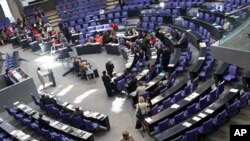Europe's efforts to stem its financial crisis cleared a hurdle Thursday as Germany's lower house approved plans to expand a bailout fund for Greece and other shaky eurozone economies. The vote comes as financial inspectors are in Athens to assess the government's progress in implementing austerity measures.
Germany's lower parliament easily passed a measure to expand the European Union's bailout fund, formally known as the European Financial Stability Facility. European leaders agreed to expand the fund in July, but it needs to be ratified by all 17 nations sharing the euro currency.
The German vote was especially crucial since Germany is Europe's biggest economy. Berlin is also expected to contribute the largest share of the bailout fund. Public opposition has been growing against paying for what many Germans believe is the inability of Greece and other debt-strapped economies to manage their finances.
German Chancellor Angela Merkel also staked political capital in the vote, since a number of politicians from her center-right coalition have been skeptical about expanding the bailout fund. She pledged support for Greece earlier this week during a meeting with Greek Prime Minister George Papandreou - who sent out a larger plea for help in remarks to German business leaders.
"The fall of the Berlin Wall heralded the end of a divided Europe. Now is not the time to rebuild walls in Europe. Europe must keep moving forward toward permanent integration, build solidly on social justice and sustainable growth," said Papandreou.
Germany's upper house is expected to approve the rescue fund measure on Friday. But a number of eurozone countries have yet to ratify it, including Austria, Cyprus, Estonia, Malta, the Netherlands and Slovakia.
Analysts and politicians say a stronger rescue fund is only one step in tackling the eurozone's financial crisis. Addressing European Parliament lawmakers on Wednesday, European Commission President Jose Manuel Barroso outlined a series of other steps needed to shore up the eurozone.
"This will require stronger mechanisms for crisis resolution. We need credible firepowers and effective firewalls for the euro. We have to build on the EFSF [the bailout fund] and upcoming European stability mechanisms," said Barroso.
European and International Monetary Fund officials will be examining Greece's compliance with austerity measures needed for it to receive more emergency funds. If Athens does not get the money soon, it risks defaulting on its debt. The belt-tightening has sparked a series of protests and strikes in Greece. Unions have called for a massive general strike next week.
Germany Approves Euro Bailout Increase

















